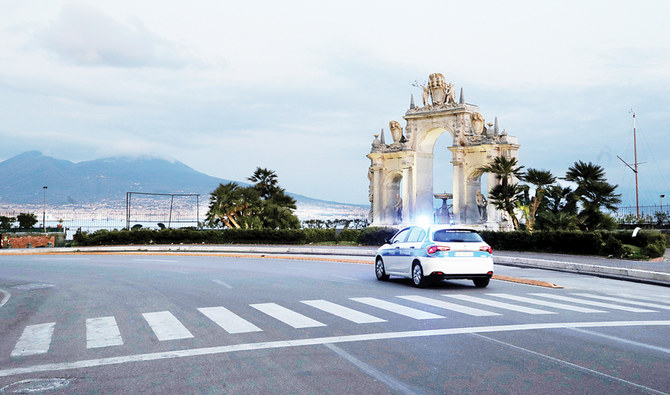ROME: As Italy mourns nearly 11,000 dead from coronavirus, and braces for the devastation of the eurozone’s third-largest economy, investigators in the country believe that organized crime is looking to capitalize on the situation.
The Economist Intelligence Unit last week said it expects Italy’s gross domestic product to contract by a colossal 7 percent for the year.
Italian experts believe that some 65 percent of small and medium businesses in the country are at risk of bankruptcy. That is music to the mob’s ears.
Italy’s mafias, from the historic Cosa Nostra in Sicily to the immensely powerful ‘Ndrangheta in Calabria and the trigger-happy Camorra in Naples, were “caught on the back foot by the virus, but are now organizing themselves,” Bologna’s Chief Prosecutor Ignazio de Francisci told Arab News.
Last weekend, Italy’s secret service warned the government of potential riots in the country’s south, fomented by organized crime, should the virus epicenter move from north to south.
The mob was believed by some crime experts to have orchestrated revolts in jails nationwide early on in the pandemic, with prisoners demanding early release, fearful of catching the disease in overcrowded facilities.
“The mob will be looking for loopholes in the system. We’ll have to keep our eyes open for suspicious operations, the creation of new companies, dummy corporations,” said De Francisci, who was a member of the anti-mafia judiciary established in the Palermo Court by Judge Giovanni Falcone, who was killed along with his wife and three security escorts in 1992 when a bomb exploded under their car on a Sicilian motorway.
Giuseppe Pignatone, a former mafia-hunter in the city of Reggio Calabria who was recently appointed by Pope Francis as chief justice in the Vatican, said the epidemic will “inevitably make the judiciary’s job more difficult over the coming weeks and years.”
Italian anti-Camorra author Roberto Saviano, who lives under police protection, said in an article in La Repubblica daily: “Just look at the portfolio of the mafias, to see how much they can earn from this pandemic.”
He added: “Where have they invested the last few decades? Multi-service companies (canteens, cleaning, disinfection), waste recycling, transportation, funeral homes, oil and food distribution. That’s how they’ll make money. The mafias know what you have, and will need, and they give it, and will give it, on their own terms.”
Saviano, who wrote “Gomorra,” a bestseller on the illegal activities of the Camorra, recalled the last big epidemic in Italy, the 1884 cholera outbreak in Naples, which killed more than half of the city’s inhabitants.
At the time, the government paid out immense sums for a cleanup, most of which went straight into the Camorra’s pockets.
It could be the same story this time. “The mafia is already carefully planning ahead to when the economy will start to be rebuilt,” said De Francisci.
Mafias are believed to be selling medical-grade masks originally intended for hospitals on the dark web, and they also have influence in the supply of groceries. They have an estimated turnover of €120 billion ($133 billion) per year.
HIGHLIGHT
Italian experts believe that some 65 percent of small and medium businesses in the country are at risk of bankruptcy. That is music to the mob’s ears.
And they are preparing for a cocaine boom when people come out of quarantine. According to a police report, mafia-linked drug dealers are already dodging the strict limits on movements placed on Italians by posing as pizza drivers and doing home deliveries.
A wave of mafia-linked extortion rackets is also predicted in the wake of the financial disaster caused by the virus.
The closures of restaurants and hotels will have a devastating effect. If money does not come from the state soon, many will fail. And in order not to fail, business owners could turn to criminal organizations.
Despite the nation’s public debt and its difficult relations with the EU and the European Central Bank, Italy’s government has already started pumping billions of euros to subsidize those who are not receiving a salary due to the closure of the businesses in which they were employed.
And Prime Minister Giuseppe Conte announced that mayors this week will issue food vouchers to help low-income people cope with the economic consequences of coronavirus.
Using an initial €400 million fund, and with an advance payment of €4.3 billion, the government wants to help the poorest sections of society.
Local municipalities will have to use this fund to buy food, medicines and other essential goods for citizens with low incomes.
This came after police with batons and guns moved in to protect supermarkets in Sicily after reports of looting by locals who could no longer afford food.
A group of locals ran out of a supermarket in the city of Palermo without paying. “We have no money to pay. We have to eat,” someone reportedly shouted at the cashiers.
Palermo Mayor Leoluca Orlando, who is recognized worldwide as one of the most engaged politicians against organized crime, told Arab News: “We’re sure that the mafia is behind all this. The state has to be watchful and provide municipalities with enough financial resources so that those in need won’t go to the mob for protection and support.”



























